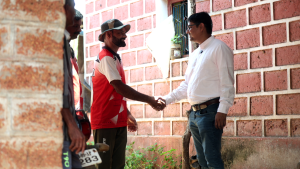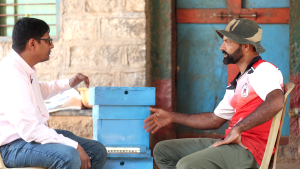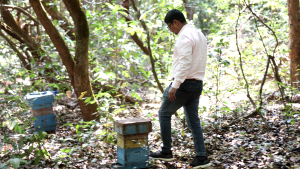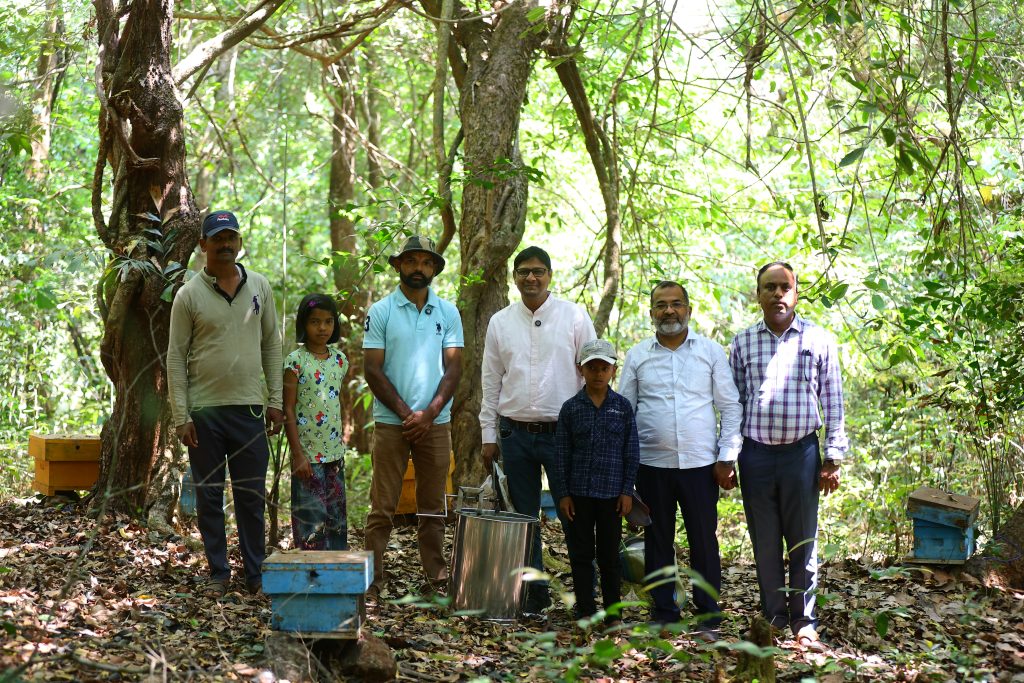Introduction: A Journey to Discover Local Beekeeping in Maharashtra
Our journey began in Pune with a shared goal—to understand the life and challenges of a local beekeeper in Maharashtra. I traveled with Mr. Ateeqe, owner of Pakeezah Honey, and Mr. Vivek, a beekeeper and founder of 24K Amravati Honey. Together, we headed toward Anturli, a quiet village located 80 km from Kolhapur. Our mission was to meet Mr. Sachin, a third-generation beekeeper working with the indigenous Cerana Indica honeybee, known for producing rare and high-quality raw honey.
A Warm Village Welcome and a Taste of Cerana Indica Honey
Upon reaching Anturli, we were welcomed by Mr. Sachin and his kind-hearted family. They offered us freshly harvested Cerana Indica honey—thick, fragrant, and pure. It was our first taste of the authenticity that defines his work. As we sat for a while and exchanged introductions, we realized how deeply beekeeping is rooted in his family’s tradition and how this local beekeeper in Maharashtra has preserved it.
Meeting a Traditional Indian Beekeeper

Mr. Sachin is not a migratory beekeeper. He practices beekeeping in his own village, using time-tested methods passed down through generations. He works with Apis cerana indica, a native honeybee that is more delicate and harder to manage than the widely used Apis mellifera. While most commercial operations chase quantity, Mr. Sachin focuses on sustainable, ethical practices that preserve honey’s purity.
Discussing Market Challenges with a Local Beekeeper

During our sit-down interview, Mr. Sachin opened up about his challenges. He explained how difficult it is to compete with cheap, adulterated honey in the market. Although he offers pure, local Cerana Indica honey, he finds it tough to get a fair price. Moreover, he shared how beekeeping has changed over time and how the current market undermines traditional methods. His honesty highlighted the real struggles that ethical beekeepers in Maharashtra face every day.
Walking Through the Forest to Discover a Jungle Apiary

After the interview, Mr. Sachin took us to his bee farm located deep in the jungle. The walk itself was calming, with birdsong and forest air setting a peaceful tone. When we reached the apiary, he showed us his bee boxes and demonstrated how he handles the bees. Watching a live honey harvest in that serene setting was eye-opening. It proved how Cerana Indica honey is not just a product—it’s an outcome of care, time, and deep understanding.
Learning from Local Beekeeping Practices in Maharashtra
This visit gave us valuable insights into the realities of local beekeeping in Maharashtra. We observed how Mr. Sachin monitors his colonies, manages their health, and uses techniques tailored to Cerana Indica bees. These bees require different handling than commercial breeds, and his experience is a testament to that.
Facing a Major Threat: Thai Sac Brood Disease
One of the most pressing issues Mr. Sachin discussed was a viral infection known as Thai sac brood. This disease is a serious threat to Cerana Indica colonies. It kills the larvae by turning them into fluid-filled sacs, leading to colony collapse. Many bees either die or abandon the hive. Mr. Sachin explained how this disease has made it harder to maintain healthy colonies and how modern techniques are slowly offering hope.
What is Thai Sac Brood?
Thai sac brood is a viral disease that affects Apis cerana bees. It causes larvae to die inside sac-like structures, weakening the hive. If not managed, the entire colony can collapse. Traditional beekeepers like Mr. Sachin, who lack advanced treatment tools, face severe setbacks due to this infection.
Blending Traditional Beekeeping and Modern Innovation
Despite these challenges, there is still hope. Mr. Sachin is starting to adopt modern practices—better box designs, natural remedies, and routine disease monitoring. By blending traditional knowledge with modern tools, this local beekeeper in Maharashtra is finding ways to protect his bees and continue producing ethical Cerana Indica honey. Our visit showed us that even remote beekeepers can thrive when supported properly.
Conclusion: Supporting Local Beekeepers in Maharashtra
This visit wasn’t just a documentation—it was an eye-opener. Beekeepers like Mr. Sachin are doing honest, difficult work to bring pure Cerana Indica honey to our tables. Yet, they struggle against market forces that reward adulteration. Supporting local beekeepers is not charity—it’s justice.
Call to Action: Choose Local Honey, Support Real Beekeepers
Help preserve the integrity of real honey. Support your local beekeeper in Maharashtra. Stop buying adulterated brands that prioritize profit over purity. When you choose raw, local Cerana Indica honey, you support families, protect biodiversity, and encourage honest work.

